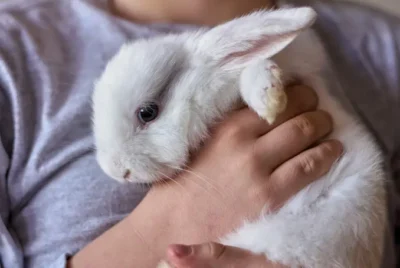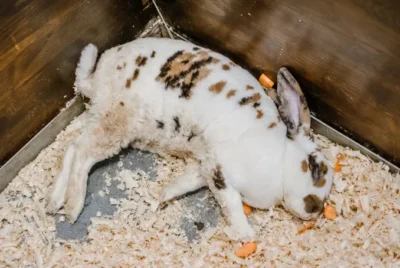Rabbits as House Pets: Pros and Cons You Need to Know
Are you considering bringing a fluffy, adorable rabbit into your home as a pet? While the idea of having a bunny hopping around might seem like a dream come true, there are some important things you should know. Just like any other pet, rabbits come with their own set of advantages and drawbacks.
In this guide, we’ll explore the ins and outs of having rabbits as house pets, helping you make a well-informed decision and ensuring a healthy, happy life for your rabbits.
Pros of Owning A Pet Rabbit
Rabbits Are Not Noisy
One of the standout advantages of owning a pet rabbit is their quietness. Unlike some other pets, like dogs or birds, rabbits are generally very quiet animals. They don’t bark, squawk, or make loud noises that can disturb your neighbors or disrupt your household. This makes them an ideal choice for people who live in apartments or near others.
Their peaceful demeanor can also create a calming atmosphere in your home. The soft sounds of a rabbit munching on hay or hopping around can be soothing and comforting.
Rabbits Can Be Potty-Trained
Contrary to the common belief that rabbits are messy animals, they can actually be potty-trained relatively easily. Many rabbits naturally choose a specific corner of their enclosure to use as a bathroom. By placing a litter box in that corner and consistently reinforcing this behavior, you can successfully litter-train your rabbit.
Potty-trained rabbits are more convenient to care for, as you won’t have to constantly clean up after them. This can save you time and effort in maintaining their living space.
Rabbits Don’t Need a Lot of Room
Unlike larger animals like dogs who require a significant amount of space to roam and play, rabbits don’t need a massive area to live comfortably. They can be kept in relatively small living spaces, such as indoor cages or hutches, which makes them suitable for people with limited living space, including apartments.
However, it’s crucial to allow your rabbit daily exercise time outside their enclosure to stretch their legs and stay physically active. Providing a secure, rabbit-proofed space where they can hop and explore is important for their well-being.
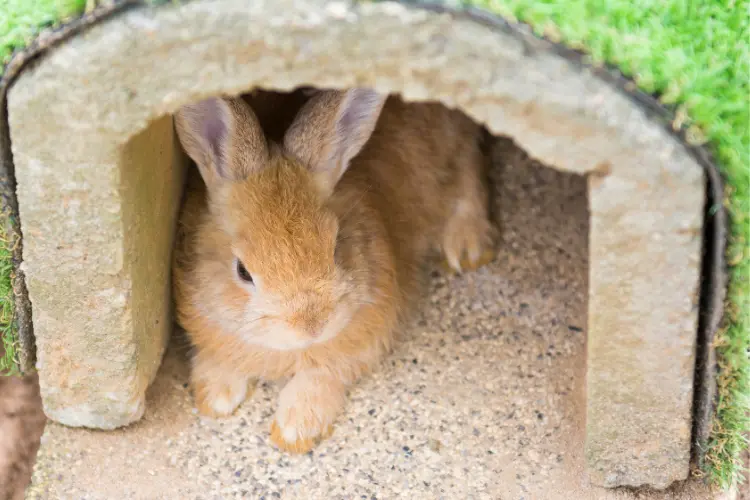
Rabbits Typically Don’t Have a Strong Odor
Rabbits are relatively odor-free pets or clean animals. Rabbit poop doesn’t produce a strong or offensive odor, especially if you clean their enclosure regularly. Many rabbit owners find it easy to manage their pets’ cleanliness and maintain a fresh-smelling environment.
Proper cage maintenance and litter training can go a long way in keeping any potential odor under control. This can be specially appealing to individuals who are sensitive to strong pet smells or live in close quarters with others.
Rabbits Can Live For Many Years
Another advantage of having rabbits as pets is their potential for a long lifespan. When well-cared for, rabbits live for many years, often reaching 8 to 12 years or even longer with proper nutrition and healthcare. This provides an opportunity for a deep and lasting bond with your pet.
The longevity of rabbits allows you to enjoy their companionship for an extended period, which can be emotionally rewarding for both you and your pet.
Rabbits Enjoy Being around People and Are Friendly
Rabbits are social animals that often form strong bonds with their human caregivers. They can be friendly, and affectionate and enjoy spending time with people. Building a connection with your rabbit can be a rewarding experience as they can become quite attached to their owners.
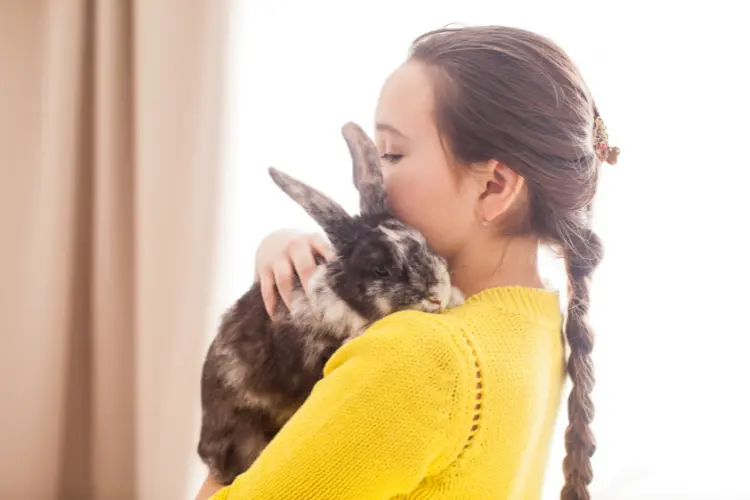
Rabbits Are Usually Calm and Not Aggressive
Rabbits have gentle and calm nature. They are generally not aggressive animals, making them great pets for families with children or individuals seeking a peaceful pet. Their docile disposition can create a relaxed and harmonious atmosphere in your home. However, male rabbits can be territorial, so they must be de-sexed.
Rabbits Like Cuddling and Being Stroked
Many indoor rabbits enjoy cuddling and being petted. When they trust their owners, rabbits tend to seek affectionate interactions, such as snuggling on your lap or leaning into your hand for strokes. This can be a heartwarming aspect of rabbit ownership, fostering a close bond between you and your pet.
You Can Teach a Rabbit Fun Tricks
Contrary to the misconception that rabbits are not trainable, they can actually learn a variety of tricks and commands through positive reinforcement training. You can teach them to jump over obstacles, come when called, or even use a litter box, enhancing their mental stimulation and your interaction with them.
If you want more surprising reasons why rabbits are the best pets, you can read more of our blogs.
Cons of Owning A Pet Rabbit
Rabbits Chew On Many Things
One significant challenge with pet rabbits is their propensity to chew on various objects, including furniture, wires, and other household items. This behavior is a natural part of their instinct to wear down their continuously growing teeth. It can damage your belongings and potentially pose safety risks, such as electrical hazards.
To prevent destructive chewing, you must rabbit-proof their homes by securing or covering electrical wires and giving plenty of safe and appropriate chew rabbit toys.
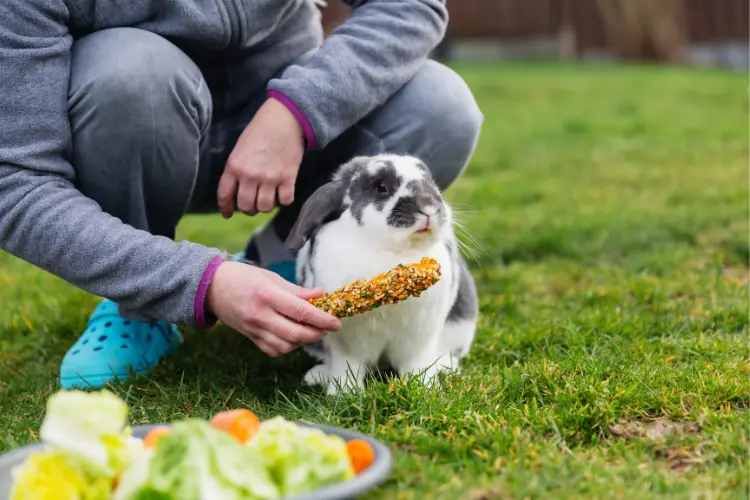
Rabbits Usually Don’t Enjoy Being Picked Up
Unlike some other small pets like cats or small dogs that may tolerate being picked up and cuddled, most rabbits do not enjoy being held or carried. They are prey animals by nature and often feel vulnerable when lifted off the ground. Attempting to pick up a rabbit that doesn’t like it can cause stress for the animal and may lead to scratching or biting.
So, I suggest respecting a rabbit’s boundaries and not forcing physical contact. Instead, focus on building trust through gentle and patient interactions.
Rabbits Need Lots of Care and Time
While rabbits are small in size, they require a significant amount of care and attention. Their enclosures need regular cleaning, and they depend on a balanced diet consisting of hay, fresh vegetables, and pelleted food. They also require social interaction and mental stimulation to remain happy and healthy.
Additionally, rabbits have a relatively long lifespan compared to other small pets, which means a long-term commitment. Their lifespan can range from 8 to 12 years or more, so you should be prepared for the responsibility of caring for them throughout their lives.
They Need Special Food
Indoor rabbits have specific dietary requirements that differ from other common pets like cats or dogs or even wild rabbits. Their diet should consist of high-quality hay, fresh vegetables, and a limited amount of pelleted rabbit food. This diet is essential for maintaining their dental health and preventing obesity.
Ensuring that your rabbit receives the right balance of nutrients and maintaining a consistent feeding routine can be challenging for some owners, especially those new to rabbit care.

Visits to the Vet for Rabbits Can Cost a Lot
Veterinary care for rabbits can be relatively expensive, and finding a veterinarian experienced in treating rabbits may not be as straightforward as finding a vet for more common pets. Rabbits can be prone to various health issues, including dental problems and gastrointestinal conditions, which may require specialized care and diagnostics.
It’s essential to budget for routine veterinary check-ups and be prepared for unexpected medical expenses that may arise during the lifetime of your rabbit. So, I recommend considering pet insurance to help cover potential medical expenses.
Rabbits Poop Often
Rabbits have a fast digestive system, producing a significant amount of feces. While rabbit poops are generally small and dry, they can be frequent. Regular cleaning of their enclosure is necessary to maintain a hygienic and clean living environment for your pet and to prevent odors.
Fortunately, rabbit droppings are not usually offensive in terms of odor, but the quantity can be a consideration for owners in daily maintenance.
They Can Get Sick or Hurt Easily
Rabbits are delicate animals, and they can be prone to various health issues. They have a sensitive digestive system, and illnesses like gastrointestinal stasis (where the digestive system slows down) can be common. Dental problems and respiratory infections are also not uncommon in rabbits.
Their bones are fragile compared to other animals, so they can be injured easily if dropped or handled roughly. You need to be vigilant about your rabbits’ health and wellbeing, including recognizing signs of illness or injury and seeking prompt veterinary care when necessary.
They Shed Their Fur Quite a Bit
Rabbits also have shedding cycles, during which they can lose much fur. This shedding can create a mess in their living area and require frequent grooming to prevent fur ingestion, leading to potentially life-threatening blockages in their digestive tract.
Regular grooming and brushing help manage their shedding and prevent fur matting.
If You Leave Them Outside, They Can Run Away Fast
Rabbits have agility and speed, and if left unsupervised outdoors, they can quickly escape or become prey to predators. Even in a seemingly secure outdoor enclosure, they may dig or jump their way to freedom.
If you plan to allow your rabbit outdoor time, it’s crucial to provide a secure, rabbit-proofed environment, such as a well-fenced, enclosed area, to ensure their safety.
To get the best pet rabbit breeds, check our guide about this.
Make an Informed Choice
Ultimately, the decision to welcome a rabbit into your home should be a well-informed one. By understanding both the advantages and disadvantages, you can give a loving and suitable environment for your pet rabbit, leading to a mutually rewarding relationship. As with any pet, the key is to be prepared, patient and committed to ensuring the well-being of your furry companion.



